Alex Cuellar
An Alignment-Based Approach to Learning Motions from Demonstrations
Nov 19, 2025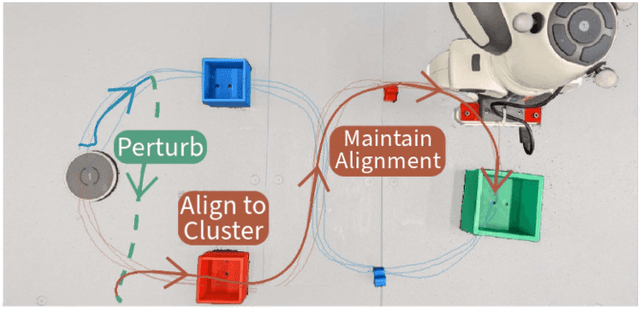
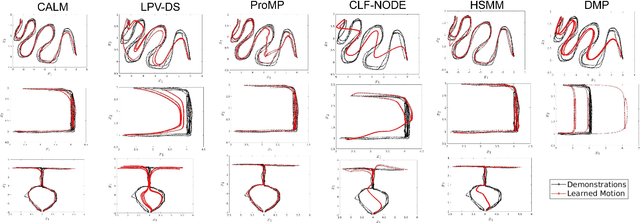
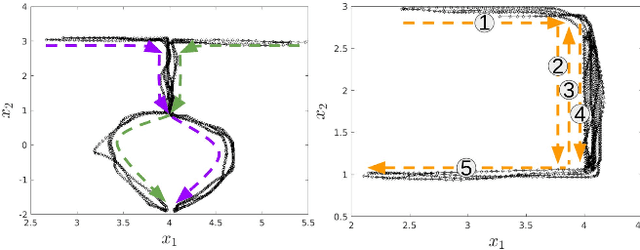
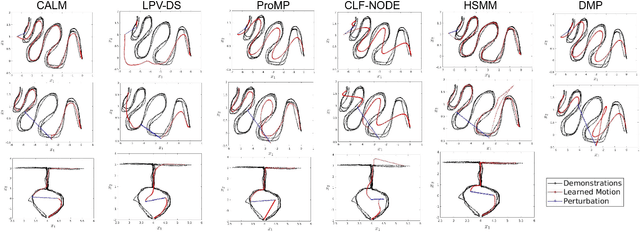
Abstract:Learning from Demonstration (LfD) has shown to provide robots with fundamental motion skills for a variety of domains. Various branches of LfD research (e.g., learned dynamical systems and movement primitives) can generally be classified into ''time-dependent'' or ''time-independent'' systems. Each provides fundamental benefits and drawbacks -- time-independent methods cannot learn overlapping trajectories, while time-dependence can result in undesirable behavior under perturbation. This paper introduces Cluster Alignment for Learned Motions (CALM), an LfD framework dependent upon an alignment with a representative ''mean" trajectory of demonstrated motions rather than pure time- or state-dependence. We discuss the convergence properties of CALM, introduce an alignment technique able to handle the shifts in alignment possible under perturbation, and utilize demonstration clustering to generate multi-modal behavior. We show how CALM mitigates the drawbacks of time-dependent and time-independent techniques on 2D datasets and implement our system on a 7-DoF robot learning tasks in three domains.
* 8 pages, 8 figures, originally published in the IEEE Robotics and Automation Letters
Inference of Human-derived Specifications of Object Placement via Demonstration
Aug 26, 2025Abstract:As robots' manipulation capabilities improve for pick-and-place tasks (e.g., object packing, sorting, and kitting), methods focused on understanding human-acceptable object configurations remain limited expressively with regard to capturing spatial relationships important to humans. To advance robotic understanding of human rules for object arrangement, we introduce positionally-augmented RCC (PARCC), a formal logic framework based on region connection calculus (RCC) for describing the relative position of objects in space. Additionally, we introduce an inference algorithm for learning PARCC specifications via demonstrations. Finally, we present the results from a human study, which demonstrate our framework's ability to capture a human's intended specification and the benefits of learning from demonstration approaches over human-provided specifications.
Automation from the Worker's Perspective
Sep 30, 2024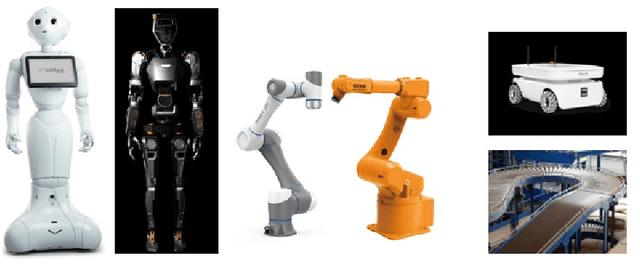


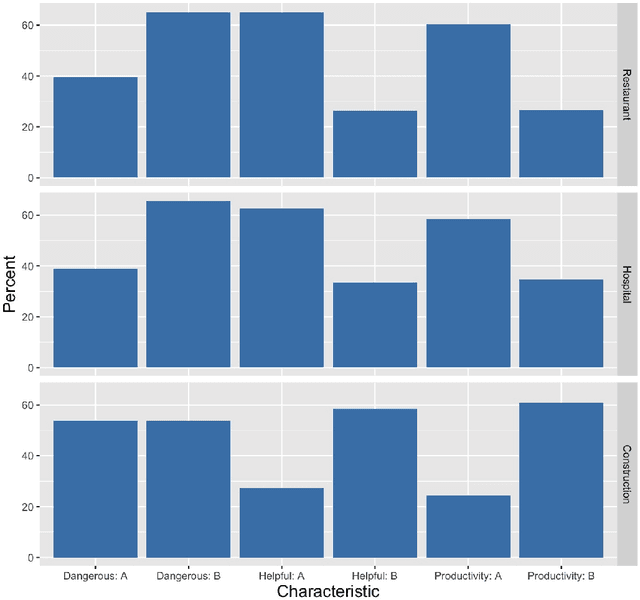
Abstract:Common narratives about automation often pit new technologies against workers. The introduction of advanced machine tools, industrial robots, and AI have all been met with concern that technological progress will mean fewer jobs. However, workers themselves offer a more optimistic, nuanced perspective. Drawing on a far-reaching 2024 survey of more than 9,000 workers across nine countries, this paper finds that more workers report potential benefits from new technologies like robots and AI for their safety and comfort at work, their pay, and their autonomy on the job than report potential costs. Workers with jobs that ask them to solve complex problems, workers who feel valued by their employers, and workers who are motivated to move up in their careers are all more likely to see new technologies as beneficial. In contrast to assumptions in previous research, more formal education is in some cases associated with more negative attitudes toward automation and its impact on work. In an experimental setting, the prospect of financial incentives for workers improve their perceptions of automation technologies, whereas the prospect of increased input about how new technologies are used does not have a significant effect on workers' attitudes toward automation.
Fair Contextual Multi-Armed Bandits: Theory and Experiments
Dec 13, 2019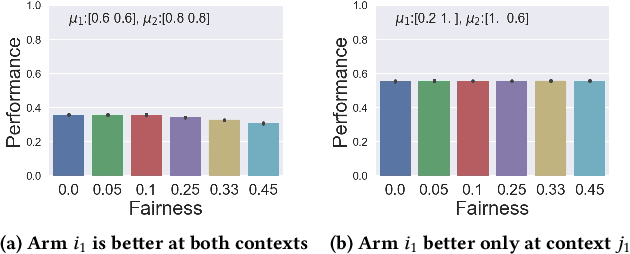
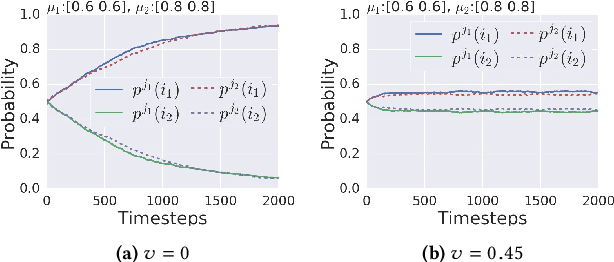
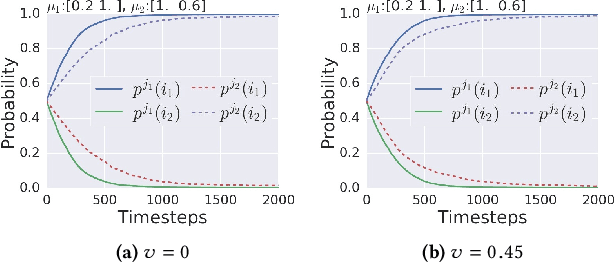
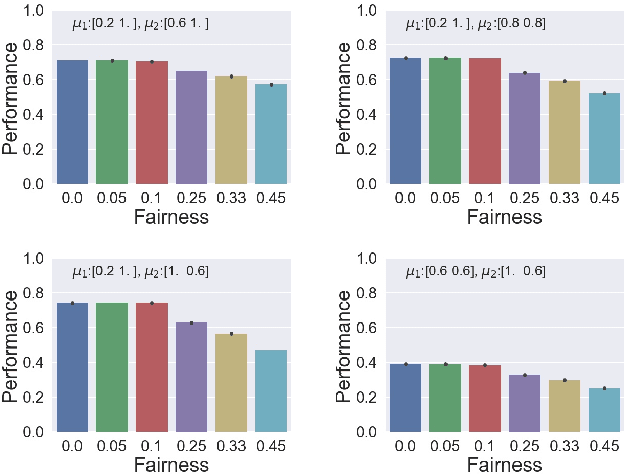
Abstract:When an AI system interacts with multiple users, it frequently needs to make allocation decisions. For instance, a virtual agent decides whom to pay attention to in a group setting, or a factory robot selects a worker to deliver a part. Demonstrating fairness in decision making is essential for such systems to be broadly accepted. We introduce a Multi-Armed Bandit algorithm with fairness constraints, where fairness is defined as a minimum rate that a task or a resource is assigned to a user. The proposed algorithm uses contextual information about the users and the task and makes no assumptions on how the losses capturing the performance of different users are generated. We provide theoretical guarantees of performance and empirical results from simulation and an online user study. The results highlight the benefit of accounting for contexts in fair decision making, especially when users perform better at some contexts and worse at others.
 Add to Chrome
Add to Chrome Add to Firefox
Add to Firefox Add to Edge
Add to Edge